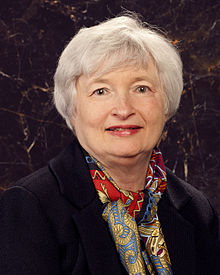
As regular readers of this blog surely know, I published a book early in 2012, Gambling with Borrowed Chips.
I'm thinking of that book anew because one of its key contentions received some support in recent days from an unlikely source, Janet Yellen, the new chair of the Federal Reserve.
One of my book's central contentions was that overly the permissive credit policy by the Federal Reserve throughout the early years of the new century under both Greenspan and Bernanke fueled the housing and housing derivatives boom, a boom that was bound to burst. Entering the new century, the Fed Funds rate was at 6.5 percent. Greenspan pressed to lower the target in several steps starting in January, so that in early September, before the 9/11 attacks, the rate was 3.5 percent.
Of course, after those attacks the Fed sought to forestall panic by lowering the rate further, to 1.25. If you only have a hammer (or only think you have a hammer) all problems look like nails.
Some people disagree with this analysis. Ben Bernanke was (unsurprisingly) disinclined to take to sackcloth and ashes. Bernanke testified before the Financial Crisis Inquiry Commission in September 2010. You can read his remarks here. He said that monetary policy was "not a principal cause of the housing bubble" and he contradicted the notion that the Fed could have prevented or short-circuited the bubble by "more-aggressive interest rate increases." This, he says, was "not a practical policy option."
So, nothing to see here, folks. Move along!
A critic of my book, Jane Gravelle, cited Bernanke's remarks on this point, and says that they "seem compelling" to her. My book's analysis of the cause of the crisis, then, is "questionable."
But Bernanke's statements were rather transparently self-serving, and even other central bankers (a cliquish, mutually-supportive club) found it difficult to second him. Jurgen Stark, a member of the executive board of the European Central Bank, delivered a paper to a meeting in Hong Kong in 2011 in which he said that central bank activism could have encouraged "and did encourage, in my view -- markets' tendency to opt for risky strategies, over-exposures, and exuberance."
Consistent with Stark's view, then, when Janet Yellen testified to the Banking Committee of the U.S. Senate on February 27th, she put some distance between herself and Bernanke on this point. She "would not argue" against the view that low rates contributed to the housing bubble.
Of course "would not argue" allows for some wiggle room. To say you "will not argue" with X isn't exactly an endorsement of X. But it is a move away from a precursor who made the case that X was simply misguided. And I think it is good news.
Comments
Post a Comment